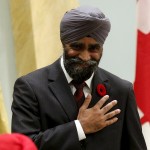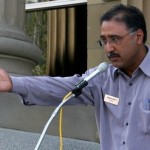Are Canada’s Sikh ministers good news for India? Not really and here’s why
 Now that Canada, not India, has the most Sikhs in the federal cabinet (four vs two), what will it mean for India?
Now that Canada, not India, has the most Sikhs in the federal cabinet (four vs two), what will it mean for India?
Not much that’s particularly good, actually, at least if you believe this Washington Post report.
Two of the ministers – Harjit Sajjan, who’s got the defence portfolio and Amarjeet Sohi, who’s got infrastructure – aren’t exactly ecstatic about the way India treats minorities, particularly Sikhs and Muslims.
Mr Sajjan is “connected to the influential World Sikh Organization,” says the Post. The WSO was established at a convention in Madison Square Garden in New YorkJuly 28, 1984 after the Indian Army’s Operation Blue Star at the Golden Temple in Amritsar. Its stated purpose was “to support the struggle of Sikhs in the Punjab for self-determination and the preservation of their distinct religious and ethnic identity.”
In a sense then, it may be a bit of an understatement for the Post to say that WSO “has links to the fringe, militant radicalism of the Khalistan movement — a Sikh separatist uprising that flared in India in the 1980s.” That said, WSO Canada doesn’t seem to dwell a whole lot on its website on the whole Indian Sikh separatist issue. And Mr Sajjan himself apparently denies links to the Khalistan cause, telling CBC last year that he has “no negative vibes from anybody” in his constituency.
Moving on to Mr Sajjan’s ministerial colleague, Mr Sohi. He was imprisoned in Bihar for two years without charge in the late 1980s, a time when the fear of Sikh terrorism led to many excesses on the part of the state.
The Post says there are reports of Mr Sohi describing torture and solitary confinement while in prison in India and it quotes The Edmonton Journal as follows: “Amnesty International took up his case, as did a local Edmonton interfaith coalition.”
There are further reports, says the Post, that Mr Sohi was subsequently accused of “training with Muslim militants in Pakistan, then of being a Maoist agent, then of having links to the Tamil Tigers.” In 1990, he was ordered by a judge to be “released forthwith” for lack of evidence. Mr Sohi says this has affected the way he views politics and identity. “Once I was mistaken for a terrorist because I was a Sikh. If we start marginalizing people here because of their faith, who does that helpIt doesn’t help us. It probably helps [the Islamic State].”
I can’t say for sure but presumably, it’s also affected his view of India?
See what I mean? It’s not necessarily good for India that Canada has so many Sikh ministers.



